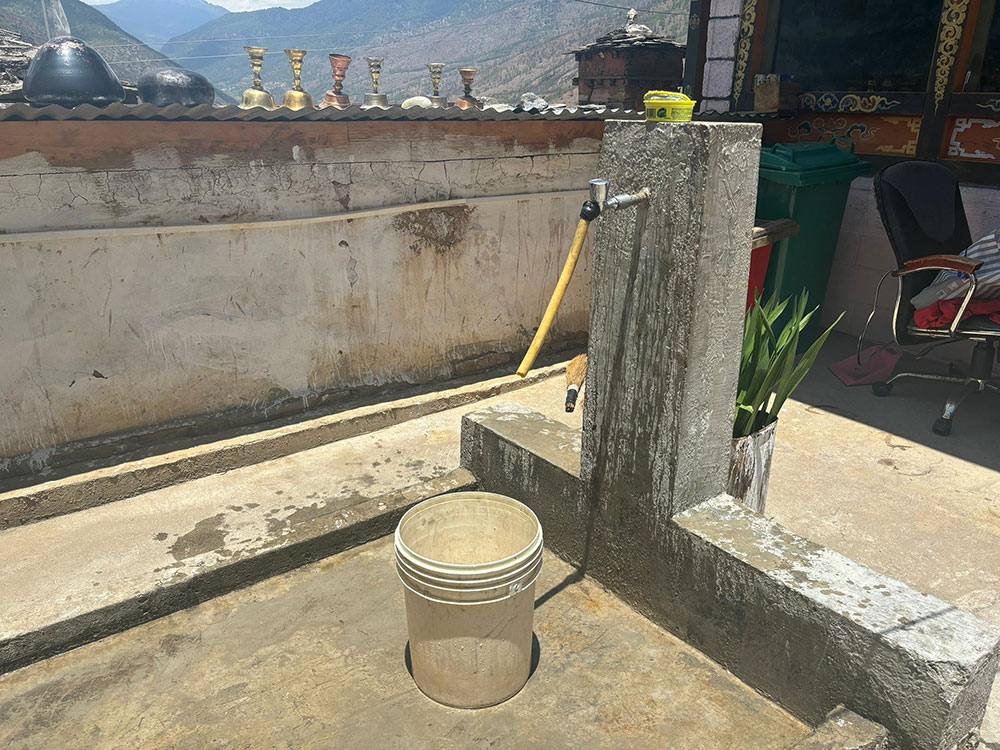
If a persistent water shortage plagues the capital city, can a nearby village be any different? In Bhutan, a water shortage is not confined to sprawling urban settlements.
Khasakha village, located 20 kilometres from Thimphu city, has been battling with a severe drinking water shortage for decades. With over 200 households and new ones emerging, the situation has hit a crisis point.
The village is located a few kilometres above Khasadrapchu town.
Earlier, the village relied on the Phandey Lum water source, seven kilometres above the village.
As the population grew, with Thimphu’s residents spilling over into the village, the water source could not meet the demand. So, the village tapped into the Wakila sources, 12 hours away. However, the new sources are but a trickle for the growing population.
In 2016, the village built two large reservoirs a few kilometres above the village. The reservoirs collect water from two different sources. But the sources are not big enough.
In around 2020, the government spent Nu 1.5 million on the Wakila water project. To top up the budget, each household contributed Nu 6,500, taking the total amount to Nu 2.6 million. However, the villagers claim that the project failed to resolve the crisis.
The village waterman, Phuntsho Namgay, said water from even two sources is not enough to fill the reservoir. He plugs the reservoirs’ outlets for two days and two nights before supplying water. “If I keep the outlet open daily, the tank won’t fill up, and I can’t distribute water equally to all the households,” he said. A 71-year-old resident, Lobsang Sherub, said water freezes in the pipes during winter, exacerbating the crisis. The water volume increases slightly in summer due to the rains.
He said most people drink water from small irrigation sources when water in their taps dries completely. The villagers do their laundry with irrigation water. “Some people even get water in their cars from other places,” he added.
The villagers have made an exception to the community temple. They have laid a separate pipe for it to enjoy a continuous water supply. The small water tank for the temple is locked up.
However, even specially designated tank and pipeline do not help. Lam Kesang Dawa, the resident lam of the temple, said during winter, he had to buy mineral water for daily water offering in the temple.
The waterman said 35 new households have been connected to the village’s water source. Sixty new households have asked for water supply.
The villagers say they have informed the gewog authorities that the Wakila project does not serve any purpose. They say only a small amount of water flows through the big pipes. Some pipes have been abandoned in the forest due to lack of water.
The villagers have requested the government implement a new water project at Tshalu Ney with a big stream.
Sangchu, 69, said a preliminary survey had been done three years ago for the new project. However, there are no updates on it.
Sangchu said the villagers also face a shortage of irrigation water. He said the villagers could not even grow vegetables on their fertile land because of the lack of water. “The villagers face a shortage of both drinking and irrigation water,” he said.
He added that the farmers had to wait for the rains to cultivate paddy. Many of them have left their paddy fields fallow.
Water is so scarce in the village that new residents are required to deposit Nu 26,000 with the drinking water committee to gain access to the village water supply. The village formed the committee to oversee drinking water supply. The committee has appointed two watermen and is paying them a monthly salary of Nu 31,000 and Nu 10,000. Annually, each household contributes Nu 2,650 to the committee to pay the watermen.
Waterman Phuntsho Namgay said that most residents living in rented apartments have left the village because of the water crisis.












